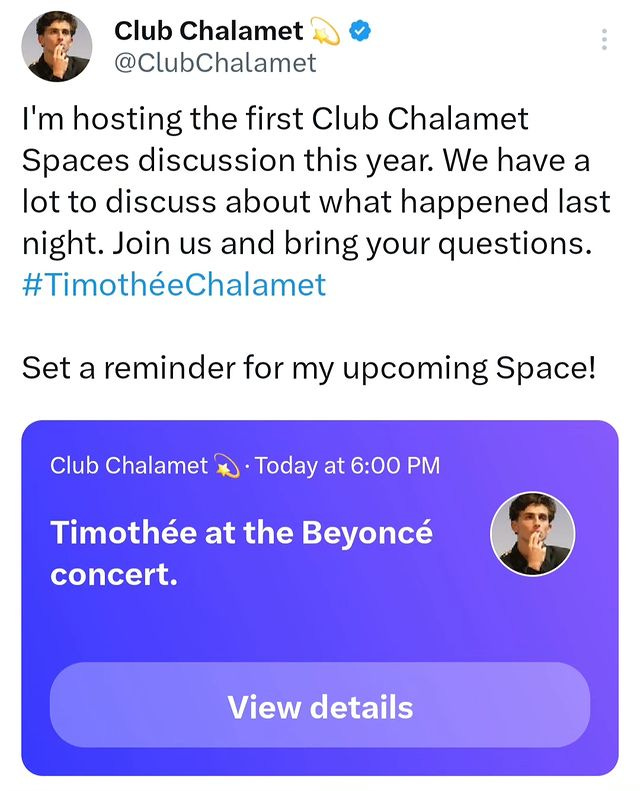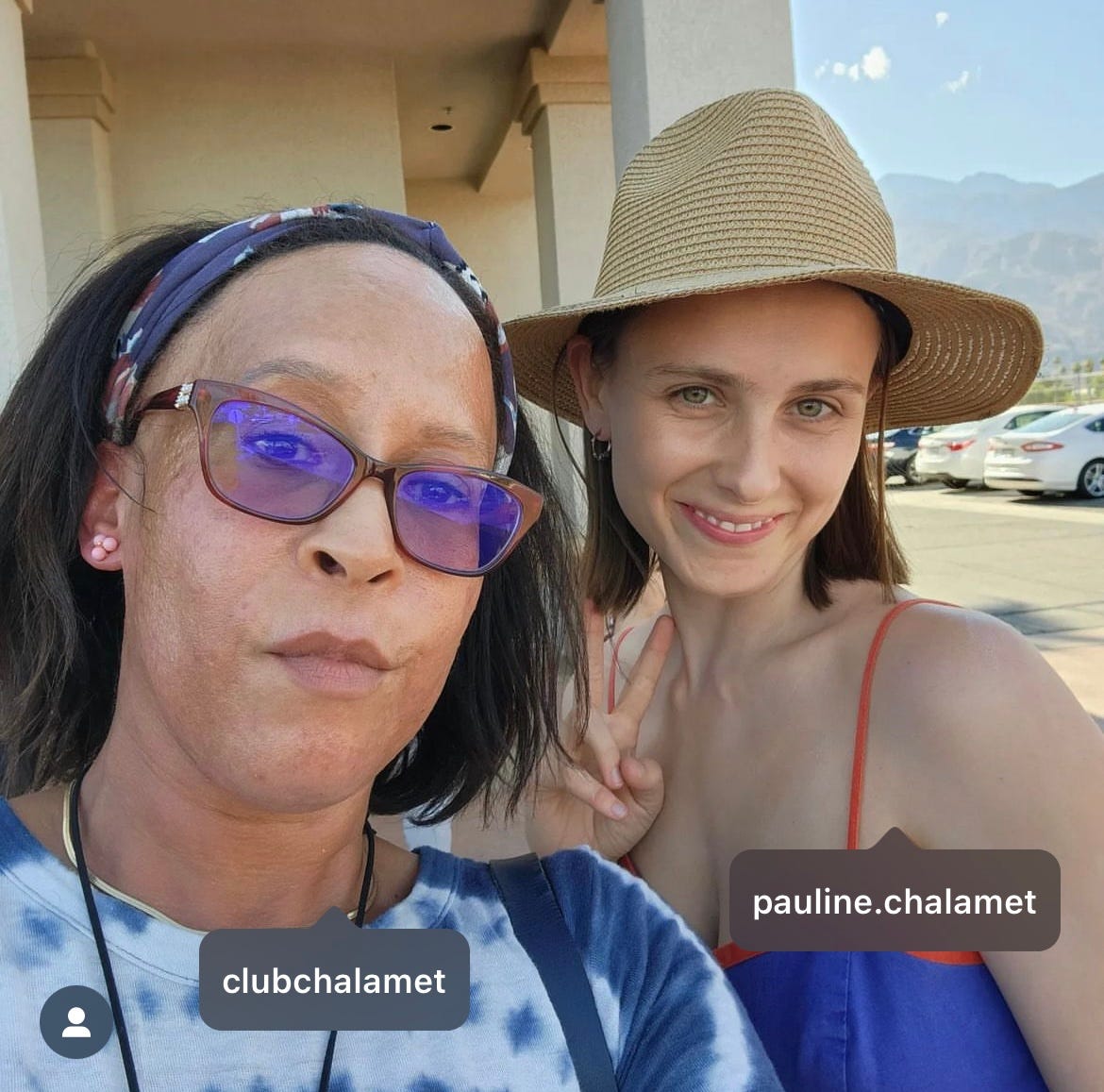I had planned to share a post today about how social media is perfectly situated to cultivate nostalgia, but how could I pass up the opportunity to write about the Club Chalamet saga?
For the uninitiated, Club Chalamet is an Instagram-, Twitter-, and discussion board-based fan community for the 27-year-old Academy Award-nominated actor, Timothée Chalamet. Chalamet—or Timmy, as affectionately called by fans—is a major Hollywood figure, currently starring as Paul Atreides in the Dune franchise and the titular character in the upcoming (and, uh, ridiculous) Wonka. He’s garnered worldwide attention as a men’s fashion icon and sex symbol, and stands out, with his acting range, French citizenship, and dark hair, from the traditional lineup of Hollywood male leads who are all named Chris.
Club Chalamet is one of hundreds (maybe even thousands) of fan accounts dedicated to Chalamet, and, at first glance, not even a particularly remarkable one: as of this morning, the account has 4,123 followers on Instagram and 2,171 followers on Twitter, numbers that likely increased following the events of the past few weeks.
What events, you ask? The Timmy fandom was thrust into crisis at the beginning of this month, on September 4th, when a video surfaced online of Chalamet kissing reality star and lip kit creator Kylie Jenner at one of Beyoncé’s Los Angeles concerts at SoFi Stadium. Most people on the internet just made jokes. But the Chalamet fans were…concerned, upset, angry, even.
Here’s where Club Chalamet’s role in the saga really took off—rather than just 1) not caring or 2) expressing frustration at Chalamet, the social media account spearheaded a narrative about Kylie Jenner, and the entire Kardashian-Jenner family, suggesting that they had fabricated the entire relationship to “redeem” Jenner’s image. Here’s an excerpt of a post from the Club Chalamet Instagram account on September 5th, the morning after “the incident”:
“After months and months of gossip media bombardment, gossip speculations, “sources” from the kajenner camp, her people stalking Timmy’s private residence, and his obvious avoidance of her, has finally paid off and had her primary objective met. Timothée has now played her hand and relented.
Based on all the DMs I have received, fans are absolutely devastated and disappointed. I don’t know what more I can say to alleviate your pain and heartache, I truly sympathize with you. Please take some time away from social media to tend to your mental health because that’s very important to me.
For those of us who know better, stay strong. This relentless pursuit of Timothée Chalamet had an end game and what better way to claim her prize than at a Beyoncé concert where half of Hollywood and the media would be there, with a special focus on the kajenners and their guests in the VIP stand.
That woman has now been redeemed in the eyes of her fans, investors, and the media. She’s a brand that needs to be rehabilitated. Whatever type of blackmail or threats she has on Timmy, she stayed the course because her reputation needed to be cleansed by someone like Timothée Chalamet.”
There’s a lot going on there! Later that day, Club Chalamet hosted a public “Spaces” discussion event on Twitter for fans to gather and ask questions about…I’m not really sure, actually. According to Twitter (whose numbers I totally don’t trust!), 8,050 people tuned into the conversation.
Here’s where I’m going to mention that the Club Chalamet account is run by 57-year-old Simone Cromer. Apparently, according to this 2019 interview with Cromer, the whole purpose of the Club Chalamet community is to create space for “a niche fanbase of mature, well-balanced adults in support of his career.” Cromer, and other fans quoted in the article, insist that their support of Chalamet is not based on sexual or romantic attraction, instead seeing themselves as “stan-mas”: a portmanteau of “grandma” and “stan” (which itself is a portmanteau of “stalker” and “fan”). But, they won’t deny that they daydream about him: “It reminds me of the thrill of young love, when you were obsessed with someone and would daydream about various 'what if' scenarios.”
Does the age of these fans—or the person running the account—matter at all in this story? Maybe! Maybe not! But it is interesting that these fans, in particular, feel so betrayed by Chalamet’s decision to date Jenner, noting that she is “not at all like” the image and branding he has portrayed to the public. (The response is different but not dissimilar from how many Taylor Swift fans reacted to the news of her dating The 1975 frontman, Matty Healy, early this year.)
And Chalamet’s branding is…what, exactly? That he’s progressive, because he’s willing to wear “feminine” outfits on red carpets? That he’s a good guy, because he was in a Greta Gerwig movie and starred in one of our generation’s biggest queer love stories? That he’s a quirky, “normal” 20-something, because he posts Instagrams like this? I don’t mean to suggest that he’s not any of these things—he totally could be! But the reality is that most of us regular, non-famous people will probably never really know.
Since the viral video and Spaces discussion, Club Chalamet has been widely accused of misogyny against Jenner and of promoting parasocial, one-sided relationships with celebrities. Here’s what Cromer had to say in response to some of these accusations:
I don’t want to be mean, here—I’m deeply fascinated by fandoms but also struggle to relate to them, having never been a particularly huge fan of anything, even things I’ve really, really loved. I’ve always wondered how people arrive at super fan or “stan” status, what makes them stay there, and how it adds to or enriches their lives. There’s a whole slew of interesting research about “celebrity worship,” noting that it can negatively impact mental health, lead to intentional self-injury and harmful substance use, foster problematic Internet use, and lead to stalking. I doubt that all super fans engage in or are even at risk for these behaviors, but it does make you wonder how extreme fandom participation has impacts beyond what may be visible on the surface.
The Club Chalamet saga, while interesting, has mostly made me wonder what fans can reasonably expect from the celebrities they idolize. Surely, many/most of us would agree that feeling a sense of entitlement or expectation over who a celebrity chooses to date is an overreach. As is crashing a wedding that Taylor Swift is attending, all in the hopes of seeing/meeting/talking to her. But what about the recent turmoil in Doja Cat’s fanbase? After expressing frustration that her fans had started referring to themselves as “Kittenz” (akin to Taylor Swift’s “Swifties,” Beyoncé’s “Beyhive,” Nicki Minaj’s “Barbz,” etc.), Doja Cat pushed back, saying her fans shouldn’t name themselves, and that if they use the term, they should instead “get off your phone and get a job and help your parents with the house.” After the interaction, when a Twitter fan account asked Doja to say she loves her fans, she replied, “I don’t though cuz I don’t even know ya’ll.” What about when Taylor Swift failed to share a “wrap-up” Instagram post after her Los Angeles Eras Tour shows, prompting some fans to take to social media to try to figure out why? Or the recent news that Drew Barrymore, who is generally beloved by the Internet, is scabbing the WGA strike?
Even if you don’t care about celebrities or the gossip they’re embroiled in, they create the art and media that entertains and challenges us, offering escapism and entertainment in their on-screen performances and in their (public performance of their) lives. For those with a fairly consistent public image, they offer a surety, a comfort, that we can rely on their humor, or good nature, or generosity, or content in a world that’s never certain. They feel stable. Known. So what do we do when they’re not who we thought?
For many of us, I think the response is a passing “yikes!” and then we move on. But for super fans—or even just big fans, who are a tier lower in the fan hierarchy—I can see why news at odds with how you’ve come to perceive an idol over time can be destabilizing. It’s a painful reminder that what you thought you knew, what you felt was certain, isn’t.
Is it fair to expect consistency from the celebrities we adore? We do, from one angle, support their livelihood: we buy and stream their music, see their movies, use their makeup, wear their clothes. But also—they’re just doing their jobs! Is it their job to do things “for” their fans, like telling them they love them, doing what they expect, giving them attention, responding to their outrage? Or is it just their job to act (or sing, or dance, or…)? Does choosing a life of celebrity mean that you accept, at some level, responsibility for engaging with the public who consumes your work? Or can you just date Kylie Jenner and not give a shit?
Further reading:








Another thoughtful entertaining piece Emma. I'm of the opinion that it's a terrible time to be famous. Celebrities have to do a balancing act with fan acknowledgement, not posting stupid stuff on social media, maintaining media interest, protecting themselves against crazies, and then somewhere in all of that, cobbling together some semblance of a life of their own.
Basketball great Charles Barkley said he didn't want to be a role model for anyone in an infamous Nike ad...and still feels that way today. He believes role models should come from the home and family, not some glamorized image of a person you don't even know in the media. A warm and fuzzy if naive thought, seeing as how people have been idolizing other people since forever. Besides, announcing you don't want to be a role model immediately turns you into one for those of a rebellious nature.
Do celebrities have a "responsibility" to their fans? In a very real sense their very livelihood depends on them, but do they owe them their lives? Not in my view. But by definition, achieving celebrity status will, whether you like it or not, complicate your life exponentially.